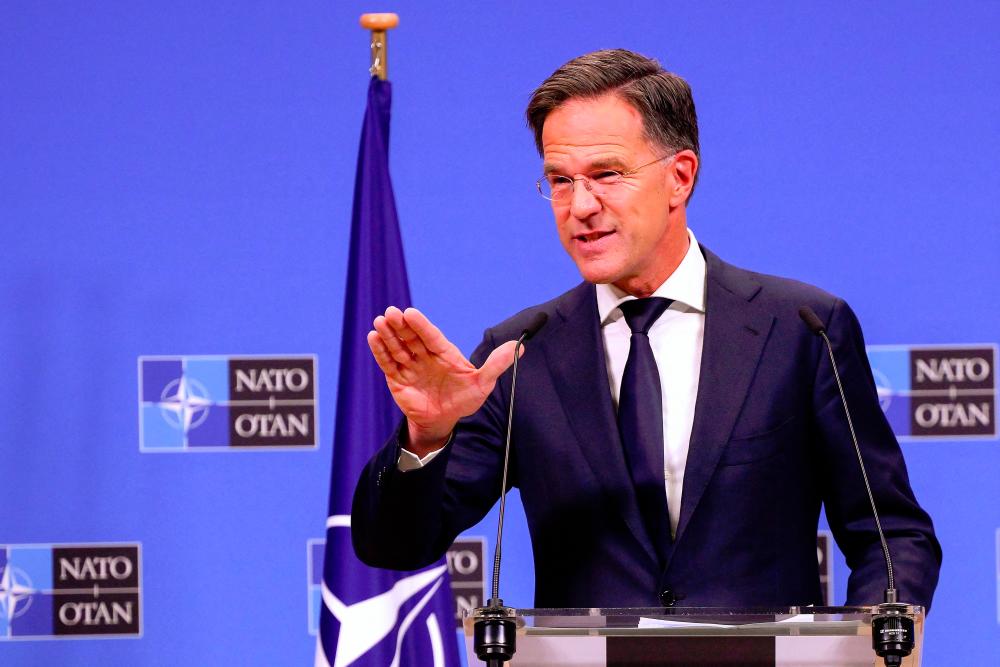THE HAGUE: A laid-back people person known for holding firm when things get tough, Dutchman Mark Rutte will need all those skills to lead NATO through one of its most challenging times.
Often pictured cycling to work while prime minister, the 57-year-old started as NATO Secretary General on Tuesday, charged with steering the 32-nation alliance through a period of Russian belligerence and possibly US indifference.
In The Hague, it was not uncommon to see Rutte shooting the breeze with fellow cyclists, shopping at his local supermarket or dining in a neighbourhood pizzeria.
He now swaps his easygoing lifestyle for the pressure cooker of Brussels, as summed up by a cartoon in Dutch daily NRC: Rutte cheerfully crunching an apple on a bike with a NATO logo, heading into a squabbling group threatened by missiles.
The 1.93-metre-tall (six feet four inches) Rutte forged a reputation as a consensus-builder but a series of scandals also tarnished his legacy in the Netherlands.
A row last year within his coalition over asylum sparked the collapse of the government, paving the way for elections won by far-right leader Geert Wilders.
In 2021, his government resigned after thousands of parents -- many from ethnic minority backgrounds -- were falsely accused of childcare subsidy fraud.
And earthquakes in the northern Netherlands caused by extraction at a gas plant also aroused anger.
“A lot went wrong there under my responsibility and I take that personally,“ said Rutte in his farewell message.
But his ability to ride out the scandals earned him the nickname “Teflon Mark” -- as his political opponents were unable to stick anything on him.
'Habit and tradition'
His other nickname is “The Trump Whisperer”, acquired for his perceived ability to manage the mercurial former US president, who may return to the White House in January.
Rutte is widely credited with rescuing a 2018 NATO summit by talking Trump around on defence spending, and he showed typical Dutch directness by brazenly contradicting the president in the Oval Office.
In an exchange that later went viral, Trump claimed it would be “positive” whether or not the EU and the United States managed to clinch a trade deal.
The visiting Rutte scoffed out loud and interjected: “No! It’s not positive. We have to work something out.”
More recently, Rutte displayed more Dutch directness at the Munich Security Conference in February, saying Europe had to work “with whoever is on the dance floor”.
“All that whining and moaning about Trump -- I hear that constantly over the last couple of days, let’s stop doing that,“ he said.
He is certainly under no illusions as to the challenge posed by Russian President Vladimir Putin, whom he has described as “cold-hearted, brutal, merciless”.
Rutte's tenure as prime minister was marked by the shooting down of Malaysia Airlines flight MH17 over Ukraine in 2014, with 196 Dutch among the 298 killed.
He described the crash as “perhaps the most profound and emotional event of my entire premiership” which “changed my personal view of the world”.
It made him all the more determined to support Ukraine “for their security and ours”.
The youngest of seven children, Rutte's father Izaak was a trader, while his mother Mieke was the sister of Izaak's first wife, who died in a Japanese internment camp in World War II.
Rutte initially wanted to be a concert pianist, but after attending the prestigious Leiden University, he joined Anglo-Dutch consumer giant Unilever, including a stint at its peanut butter division, Calve.
He describes himself as a “man of habit and tradition” who has spent his whole life in The Hague and volunteers as a teacher.
His public image is perhaps best summed up by his regular hairdresser, Marco Rimmelzwaan, who said that “Mark doesn’t like change, he always wants the same thing”.









